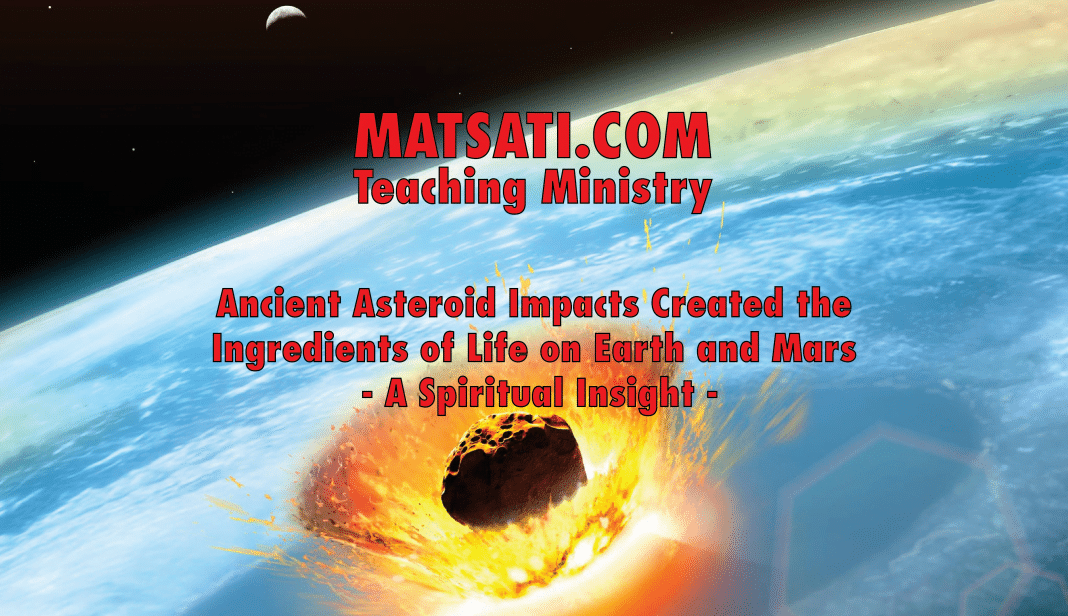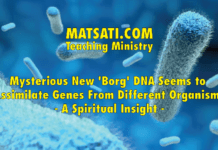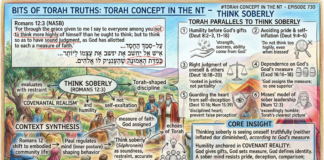A new study was published in the Journal of Scientific Reports [1] which studied the reaction on impact induced amino acid formation. The belief is asteroid impact sites in the ocean may possess a crucial link in explaining the formation of the essential molecules for life here on Earth. The researchers manufactured a single state propellant gun to simulate impact-induced reactions at the National Institute for Materials Science, Tohoku University, Center for High Pressure Science & Technology Advanced Research (HPSTAR), and Osaka University. The simulated reactions involved the hypothesis that when a meteorite crashes into the ocean there may have been the required elements to start the process of life. Researchers used a combination of CO2, N2, H2O, and Fe in a laboratory impact facility to simulate the conditions. The impact reactions formed amino acids which are the direct constituents of proteins which catalyze many biological reactions.
References
- Yuto Takeuchi et al. Impact-induced amino acid formation on Hadean Earth and Noachian Mars, Scientific Reports (2020). DOI: 10.1038/s41598-020-66112-8
The CO2 and N2 functioned as the carbon and nitrogen sources for the formation of amino acids. The hypothesis that an ocean once existed on Mars also raises the question of exploration in the sense that the researchers are seeking to find life on Mars. The thought is that CO2 and N2 were also major constituent gases in the Martian atmosphere when the ocean existed. It is believed only much later in Mar’s history when the mechanism of internal convection stopped and Mar’s magnetic field collapsed, leading to the current situation of solar wind induced atmospheric loss (Read article here). The study on impact-induced amino acid formation also leads researchers to believe ancient Mars had the ingredients necessary for the possible source of the formation of life, on Mars. The researchers are continuing their studies, to understand how meteorites influenced the more complex biomolecules on both Earth and Mars.
The Spiritual Insight that we receive from this type of research is related to this idea that God did not create life, it was simply a matter of random chance and evolution, or that God created life through a directed evolutionary process (Theistic Evolution). When we consider the idea of having faith, and believing in the creation account (Bereshit / Genesis 1-2), that God created the world and the universe as we know it in six literal days, many have said this is not really possible, or that the first few chapters of the Torah are poetic and not to be taken literally. This shows a lack of faith in God’s ability to create within the time frame specified in the Torah. Faith is a fundamental principle in our relationship with God! When we have faith, we are believing in the One who is able to be faithful to us. The book of Hebrews offers a definition of faith that we all are familiar with:
Hebrews 11:1
Now faith is the substance of things hoped for, the evidence of things not seen. (NASB, הָאֱמוּנָה הִיא בִּטָּחוֹן בְּמַמָּשׁוּת הַדְּבָרִים אהַמְקֻוִּים, הוֹכָחַת דְּבָרִים שֶׁאֵינָם נִרְאִים)
Here the word “substance” refers to truth (“what is truth? and What it really consists of?”). The Hebrew translation of the NT uses the word בִּטָּחוֹן (trust / confidence / hope) for the Greek word ὑπόστασις which means “assurance” something that we can trust in which is solid to support us in both what we believe and how we live. The Hebrew phrase הוֹכָחַת דְּבָרִים שֶׁאֵינָם נִרְאִים “Proof/Conviction of things not seen” refers to us having an assurance that is not based primarily on personal experience or empirical evidence but upon the character and purposes of God. This is the type of faith and life (being faithful) which characterized those mentioned in Hebrews 11. These people relied upon and trusted in the promises of God without any visible evidence God’s promises would be fulfilled (see Hebrews 11:10, 11:11, 11:13, 11:39–40). Remember how Abraham was 100 years old, and was promised a son, and the Lord God Almighty brought this promise to life in Isaac. Faith involves trusting in and believing in someone or something. The Scriptures provide us with what to believe in, and when we stop believing in the truth found in the Scriptures, this affects every aspect of our faith in the Scriptures. We read according to the Torah, in Devarim / Deuteronomy 7:9 the following:
Devarim / Deuteronomy 7:9
“Therefore know that the Lord your God, He is God, the faithful God who keeps covenant and mercy for a thousand generations with those who love Him and keep His commandments.” (NASB)
The Torah states that God is faithful and keeps His Covenant and mercy to those who love Him!
Hebrews 10:23
Let us hold fast the confession of our hope without wavering, for He who promised is faithful. (NASB)
These Scriptures teach us about the faithfulness of God and His keeping His covenant promises. The Scriptures also teach us that God is true (John 3:33) and cannot lie (Titus 1:2). This means that He has communicated His truth through His Word (the Tanakh and the Apostolic Writings) via the apostles and prophets. Paul also wrote the following:
1 Thessalonians 2:13
For this reason we also thank God without ceasing, because when you received the word of God which you heard from us, you welcomed it not as the word of men, but as it is in truth, the word of God, which also effectively works in you who believe. (NASB)
Paul says the people believed in the Word of God as having come from God. Today however there are many who would set this idea aside to say the creation account is not truthful, it is only poetic, the Lord God did not speak all of creation into existence. The question arises on whether the Hebrew creation account is historical narrative or not? Grammarians generally attempt to classify a text by syntactic considerations and semantic considerations. Typical Hebrew historical narratives begin with the 1st verb as the qatal perfect from the Qal verbal pattern (qatal, qatel, qatol).2 The qatal type is the most common of the three where the qatel and qatol are a smaller group of verbs. Verbs of the qatal group are action verbs, and can be either transitive (taking a direct object) or intransitive (not taking a direct object). In English, historical narrative, the verb is placed in form to indicate the time of the action in relation to the time of the occurrence of the event. In Biblical Hebrew verbs do not have tense in the strict sense of the word. Time occurrence is indicated in context by adverbs and the way the sentence is constructed.3 In Hebrew literature the finite verb indicates aspect, whether the speaker or writer is an outsider looking at the situation as a complete whole (“perfect”) or as an insider looking at a situation as it develops (“imperfect”). As we study the Torah, we can see how battles that are depicted (narrated) from the perspective of an outsider who knows the entire situation from beginning to end. Such a writer would use verbs in the qatal perfect.2 The 1st qatal verb then is followed by the vav consecutive. The perfect followed by the vav consecutive of the perfect connects itself with the tense of the mood of the verb. What happens is the narration begins with the perfect and then follows with the imperfect with vav consecutives. This is the way past events are narrated. For example, ויהי (and it happened) and ויומר (and he said), or ויעש (and there was), etc.
Examples (vav-consecutive)
- Verb Qal (qatal) Perfect
- Then follows ויהי (Translated: “and it happened”)
- or ויומר (Translated: “and he said”)
- or ויעש (Translated: “and there was”)
- or וימצא (Translated: “and he found”)
- or ויצעק (Translated: “and he shouted”)
- or וישב (Translated: “and he dwelled/sat”)
- etc
To study this further, compare the text from Bereshit / Genesis 1 (Creation account), Devarim / Deuteronomy 3:1-5 (War with Og king of Bashan), 1 Kings 6 (Construction of the first temple), and Nehemiah 2 (The Exile return to Israel). When we sit down and actually study how these texts are related grammatically (via the Vav-Consecutive), it becomes very evident the creation account is written in a historical narrative. This draws out a very important aspect of the claim Bereshit / Genesis 1 is not real, or is only poetic, or is the way the ancients described evolutionary processes (i.e. day-age (gap) theory, etc). These claims illuminate the lack of faith in the Word of God! The reason this is so signifcant of a problem in matters of faith is due to something Yeshua said concerning Himself!
John 5:46
5:46 If you had believed Moses, you would believe Me, because he wrote about Me. 5:47 But since you do not believe what he wrote, how will you believe what I say?”… (BRB)
If we consider these words from Yeshua about the truthfulness of the Torah in relation to who he is, if we do not believe what Moshe wrote, this leads to problems in faith believe in both what Yeshua said and in who He is (i.e. His purpose of laying down his life for ours). The Scriptures describe how Yeshua came to earth to live a perfect life, to die a criminal’s death, and to rise again three days later, all because “God so loved the world” (John 3:16). In addition to this, we are told anyone who believes that Yeshua is Lord and that He was raised from the dead will have “everlasting life” (Romans 10:9). These are some very significant claims about Him and His purpose! But what does believing in the creation account have to do with believing in Yeshua? These things are related due to our being able to have faith believing God is powerful enough to do these things as His Word states them to be true. Take the example from Bamidbar / Numbers 17.
Bamidbar / Numbers 17:16-24
וַיְדַבֵּ֥ר יְהוָ֖ה אֶל־מֹשֶׁ֥ה לֵּאמֹֽר׃ The LORD spoke to Moses, saying: דַּבֵּ֣ר ׀ אֶל־בְּנֵ֣י יִשְׂרָאֵ֗ל וְקַ֣ח מֵֽאִתָּ֡ם מַטֶּ֣ה מַטֶּה֩ לְבֵ֨ית אָ֜ב מֵאֵ֤ת כָּל־נְשִֽׂיאֵהֶם֙ לְבֵ֣ית אֲבֹתָ֔ם שְׁנֵ֥ים עָשָׂ֖ר מַטּ֑וֹת אִ֣ישׁ אֶת־שְׁמ֔וֹ תִּכְתֹּ֖ב עַל־מַטֵּֽהוּ׃ Speak to the Israelite people and take from them—from the chieftains of their ancestral houses—one staff for each chieftain of an ancestral house: twelve staffs in all. Inscribe each man’s name on his staff, וְאֵת֙ שֵׁ֣ם אַהֲרֹ֔ן תִּכְתֹּ֖ב עַל־מַטֵּ֣ה לֵוִ֑י כִּ֚י מַטֶּ֣ה אֶחָ֔ד לְרֹ֖אשׁ בֵּ֥ית אֲבוֹתָֽם׃ there being one staff for each head of an ancestral house; also inscribe Aaron’s name on the staff of Levi. וְהִנַּחְתָּ֖ם בְּאֹ֣הֶל מוֹעֵ֑ד לִפְנֵי֙ הָֽעֵד֔וּת אֲשֶׁ֛ר אִוָּעֵ֥ד לָכֶ֖ם שָֽׁמָּה׃ Deposit them in the Tent of Meeting before the Pact, where I meet with you. וְהָיָ֗ה הָאִ֛ישׁ אֲשֶׁ֥ר אֶבְחַר־בּ֖וֹ מַטֵּ֣הוּ יִפְרָ֑ח וַהֲשִׁכֹּתִ֣י מֵֽעָלַ֗י אֶת־תְּלֻנּוֹת֙ בְּנֵ֣י יִשְׂרָאֵ֔ל אֲשֶׁ֛ר הֵ֥ם מַלִּינִ֖ם עֲלֵיכֶֽם׃ The staff of the man whom I choose shall sprout, and I will rid Myself of the incessant mutterings of the Israelites against you. וַיְדַבֵּ֨ר מֹשֶׁ֜ה אֶל־בְּנֵ֣י יִשְׂרָאֵ֗ל וַיִּתְּנ֣וּ אֵלָ֣יו ׀ כָּֽל־נְשִֽׂיאֵיהֶ֡ם מַטֶּה֩ לְנָשִׂ֨יא אֶחָ֜ד מַטֶּ֨ה לְנָשִׂ֤יא אֶחָד֙ לְבֵ֣ית אֲבֹתָ֔ם שְׁנֵ֥ים עָשָׂ֖ר מַטּ֑וֹת וּמַטֵּ֥ה אַהֲרֹ֖ן בְּת֥וֹךְ מַטּוֹתָֽם׃ Moses spoke thus to the Israelites. Their chieftains gave him a staff for each chieftain of an ancestral house, twelve staffs in all; among these staffs was that of Aaron. וַיַּנַּ֥ח מֹשֶׁ֛ה אֶת־הַמַּטֹּ֖ת לִפְנֵ֣י יְהוָ֑ה בְּאֹ֖הֶל הָעֵדֻֽת׃ Moses deposited the staffs before the LORD, in the Tent of the Pact. וַיְהִ֣י מִֽמָּחֳרָ֗ת וַיָּבֹ֤א מֹשֶׁה֙ אֶל־אֹ֣הֶל הָעֵד֔וּת וְהִנֵּ֛ה פָּרַ֥ח מַטֵּֽה־אַהֲרֹ֖ן לְבֵ֣ית לֵוִ֑י וַיֹּ֤צֵֽא פֶ֙רַח֙ וַיָּ֣צֵֽץ צִ֔יץ וַיִּגְמֹ֖ל שְׁקֵדִֽים׃ The next day Moses entered the Tent of the Pact, and there the staff of Aaron of the house of Levi had sprouted: it had brought forth sprouts, produced blossoms, and borne almonds. וַיֹּצֵ֨א מֹשֶׁ֤ה אֶת־כָּל־הַמַּטֹּת֙ מִלִּפְנֵ֣י יְהוָ֔ה אֶֽל־כָּל־בְּנֵ֖י יִשְׂרָאֵ֑ל וַיִּרְא֥וּ וַיִּקְח֖וּ אִ֥ישׁ מַטֵּֽהוּ׃ (ס) Moses then brought out all the staffs from before the LORD to all the Israelites; each identified and recovered his staff. (Sefaria)
Note how Aaron’s staff which was dead, budded, produced leaves, blossomed, and then produced almonds. Notice something here, God brought this stick back to life and caused it to go through three seasons of growth in less than 24 hrs. The question that is presented to us in Bamidbar / Numbers 17 is “do we believe what Moshe wrote here in the Torah?” Do you believe this is possible? Note how when believing one part of the Bible is not real, this leads to having to believe other parts of the Bible are also not real (i.e. Bamidbar / Numbers 17) If one believes this is impossible, how could one believe God raised Yeshua from the dead? Wouldn’t bringing a stick back to life be easier than bringing the human body back to life? This is how and why what we believe about the creation account is directly related to our faith in Yeshua as the Messiah of God! We must believe all of God’s Word, and we believe because we have faith in a God who is faithful (Devarim / Deuteronomy 7:9, 1 Corinthians 1:9, 2 Timothy 2:13, Hebrews 10:23, 11:11, Revelation 3:14).
We either have a Reliable Record in God’s Word or we don’t! We have faith because we believe in God’s Word because the Lord God Almighty Himself claims to be faithful to us and to His covenant. He promised that his Word would never pass away (Isaiah 40:8 and Mathew 24:35). We know the Lord God never fails us (Joshua 21:45). Because of these things, we regard the Word of God, the Scriptures, as reliable, sufficient, and true because the Word has been given to us from God! Moreover, the Lord God of Israel has proven Himself true over and over again according to the Scriptures. His power was demonstrated through the power of His Word creating all that we know! Throughout Scripture we read eye witness accounts of the Lord fulfilling His promises. We also know that operational science (observable, testable, and repeatable experimentation) is consistent with Scripture. Note that evolutionary theory and the tests and experiments involved such as what we see in this week’s study, [1] are based heavily upon the presupposition that evolution was the only way by which we were created. What we are studying here is how the basis of our faith comes from God, and His Word (Romans 10:17 “Faith comes by hearing, and hearing by the word of God.” (NASB)) Faith in the RELIABILITY of God’s Word is absolutely important, and necessary for us to believe in Yeshua, who He was, and His purpose of laying His life down for our behalf. Our faith in Yeshua is not based just upon this, but also upon whether the Lord God of Israel has the power to raise Yeshua from the dead to live forever. This connects us to having faith in God’s ability as Creator to bring life to that which was dead (i.e. the creation account). The Word of the Torah, the written Word Moshe penned, do we believe what Moshe wrote of the Messiah? Do we believe what He wrote of the creation and the power of God to give life to the dead? The Torah is filled with miracle after miracle, and the question is do we believe these things that are written about God and His power? If we do not, or if we doubt, can we expect that same power to live and work in and through us? It all comes down to faith, and the question of whether we have faith in the Lord God Almighty, in Yeshua the Messiah, and in the reliability of God’s Word which speak of these things?
References
- Midrash Rabbah on Exodus xlvii. 6.
- Seow, C. L., A Grammar for Biblical Hebrew, Revised Edition; Kelby Bowers, Compublishing: Cincinnati, Ohio, 1995; p 145-153.
- Rodiger, D. E.; Chrestomathy, A., Gesenius’ Hebrew Grammar; 17 ed.; D. Appleton & Company: New York, 1856; p 222-223.
Presentation on vav-consecutive with examples









